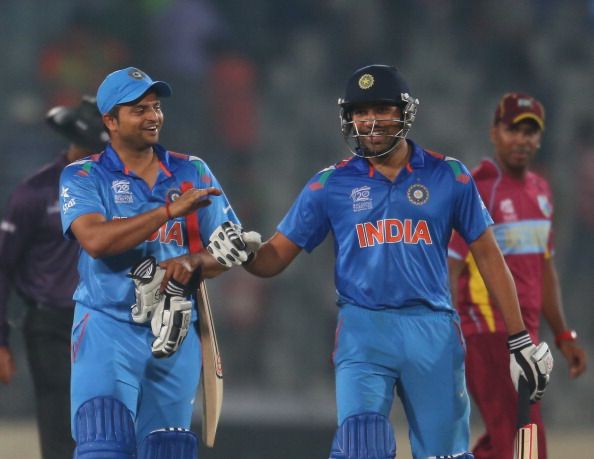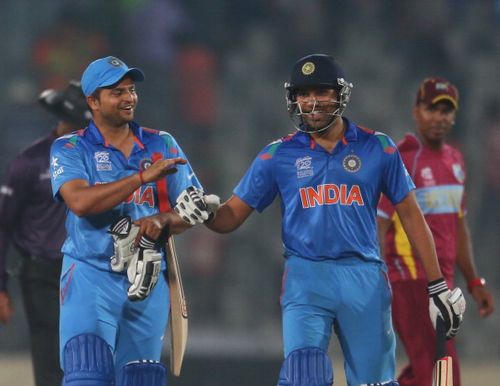
Boundary or a single? Confusion over winning runs continues in World T20

Twice in a row now in the ongoing World T20, India has completed a 7-wicket win. Twice in a row now Suresh Raina has hit the winnings runs. And twice in a row now Suresh Raina and India have been deprived of a boundary.
Against Pakistan, it was a flick [The India-Pakistan scorecard confusion]. On Sunday against West Indies, Suresh Raina’s full blooded cut through point reached the boundary, and though cameras cut away from the batsmen, in the highlights it looks like Rohit Sharma stopped midway after Raina’s hit and didn’t make his ground at the striker’s end. India and Raina were awarded 1 run, and India finished its innings at 130/3 when it should have been 133/3 instead.
Just like popular cricket statistician Mohandas Menon’s reply earlier, the reason for counting the last hit as a single is given by ESPNcricinfo in its text commentary as the crossing over of batsmen, meaning that Raina and Rohit crossed each other before the ball reached the boundary and hence only a single was scored.
But clearly, Law 18 in MCC Laws of Cricket states that a run is scored “so often as the batsmen, at any time while the ball is in play, have crossed and made good their ground from end to end.”
“Made good their ground from end to end”? Kohli surely didn’t do that against Pakistan and just watched the ball reach the boundary halfway down the pitch. Today, Rohit too let out a sigh of relief before turning around mid-pitch and celebrating with Raina.
3 runs were probably too less to create any hue and cry. But what about 6 now? Can 6 runs, and more importantly, their effect on India’s Net Run Rate be simply ignored? What if this happens in the next match too?
And if after all, everyone is interpreting the winning runs as the crossing over of batsmen, then let’s recall a small controversy that happened in the 5th ODI between Bangladesh and West Indies in December 2012 at Mirpur.
With the series tied 2-2, Bangladesh needed 1 run off 38 balls to win it all. Nasir Hossain chipped a delivery over covers and started celebrating. The batsmen crossed each other too, but Elias Sunny, seeing his partner celebrate, did not complete the run and turned back to join the celebrations, thinking the ball had reached the boundary.
But it hadn’t. Though Bangladesh players invaded the ground, umpires called back Hossain and Sunny and told them the match wasn’t over, that they hadn’t completed the winning run. Everyone returned to their positions, Andre Russell bowled the next ball and this time Nasir Hossain cut it away, making sure it crossed the ropes. The winning hit was counted as a four.
Darren Sammy was the skipper in that match too, and his players appealed for a run-out amidst all the confusion! But by a stroke of luck, both batsmen had made themselves safe as Nasir Hossain ran back to take a stump from the striker’s end as a memento, thus rendering both batsmen safe inside the crease.
This time it’s not about whether India won the match or not, but the fact that 6 runs which were rightfully earned by Suresh Raina and India, have simply been denied to them. India may go on to win all their group matches and the Net Run Rate may become irrelevant, but can there be clarity over the rule here?
Had MS Dhoni and Yuvraj Singh crossed each other before the ball sailed over the long-on boundary on 2nd April 2011, would Dhoni’s score be considered 86* instead of 91*. Would it then have gone down in history books as one of the most iconic sixes?
Irrespective of whether NRR is taken into account or not, despite delaying the start of 2nd innings today due to confusion over a single run in the West Indies innings, hardly anyone seems concerned about these lost 6 runs.
PS: It hurts more when you have Raina as your fantasy team captain.